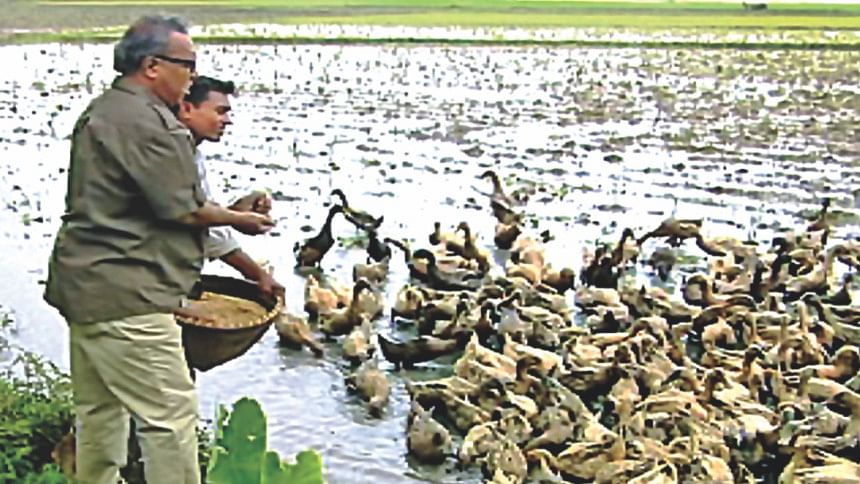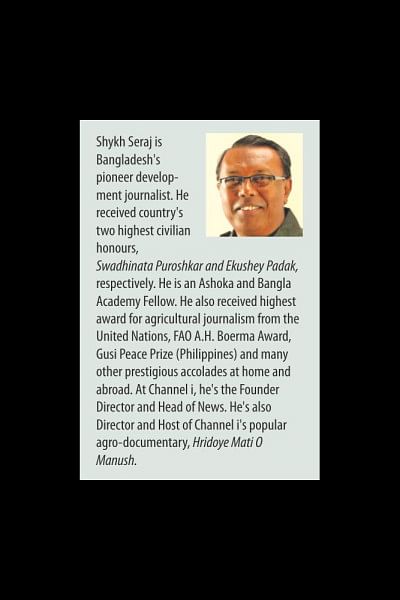Duck rearing turns boon for marginal families

Khutigachha village in Sirajganj's Tarash upazila is very well known for duck rearing. It's amazing to see them in groups swimming through the beels (wetland) of Tarash. The landscape is ideal as the green rice fields are right on the banks of these beels full of transparent water. What we see in dry season, is exactly the opposite here in monsoon. Everything goes under the beel's water. It is a beautiful natural backdrop.
Meanwhile, ducks in the region are bringing good luck and money flow for the rural farmers here. Along with cultivating rice and fish, farmers are getting extra financial benefit from rearing ducks in open waterbodies. Not only in Khutigachha, but around the Chalan Beel area the economic outcome has changed positively because of the ducks. Homemakers are also involved in rearing ducks and taking care of them throughout the entire day.
Jahanara Khatun is one of those homemakers. She married a local day-labourer of Tarash. They were very poor indeed. As her husband didn't have his own land, so he had to work on other people's lands. It was getting tough every day to meet all the needs of the family. Some days they could manage food, and some days they had empty stomach. Jahanara always had intentions of increasing their income by working alongside her husband. She didn't have any educational background. She saw another farmer Abdul Alim's duck farm and was inspired by Alim's success. She started a very miniature duck farm. And, now, she has more than thousands.
"My success was gradual and steady, and my patience and perseverance paid off,” says Jahanara. She's doing really well and during my visit to Khutigachha, I heard people mentioning about her courage. Jahanara's ducks are pretty healthy and people buy at least 400-500 ducks at a time.
"You know, I bought 10 kathas (16 decimals) of land," says happy Jahanara.
"What about your children, are they studying?" I asked.
"My elder son goes to school and my month end balance is Tk 15,000 (USD 178)," replied Jahanara.
"The entire family now depends on my income," added bold Jahanara.
Jahanara's success had a great impact on the society as well. Shaju Akhter, another woman, shared her story with me.
"Ducks are like blessings to me, I'm also planning to rear swans as they are not attacked with too many diseases and they are more profitable," says Shaju.
The area is not much different than haor areas. Inside the village, I saw flocks of ducks in the street. There are many big and small farms in Khutigachha village. Locals claim that there are 800 duck farms in Tarash upazila alone. By raising ducks, many poor families like Jahanara's and Shaju's turned well-off. Many make their living by raising ducks throughout the whole year now. Many are involved in hatching eggs of ducks. On the other hand, many go far away to raise ducks. Overall, duck plays a pivotal role in changing the socio-economic state of the locals.
The pro-duck farmer Abdul Alim's farm is 30 year old. He is from the same village. He used to be a simple day-labourer before. With extreme effort, he raised his ducks later on and bought seven bighas (2.31 acres) of land from the earnings from ducks.
"I sent abroad my son for higher studies with the earnings from ducks," said Alim.
"I have also trained 150 farmers on duck rearing," he added.
In the several farms of this area, it was difficult to get good quality baby duck once. To get rid of that problem, there are many local hatcheries now. From those, baby ducks of great quality are being produced. Amir Hossain is producing them using local durable technology with hurricane lamp. During the 90's, I had shown the process of producing baby ducks on Bangladesh Television's Mati O Manush (Soil & People) programme. Many are still successfully doing it and Amir Hossain is one of them.
Rabiul Islam is another educated young farmer who raises ducks for three months during monsoon. He says he gets profit of at least Tk 1 lakh (USD 1190) every year.
The success stories of this village are interlinked with one another. Duck has changed the economic state of this village. Do you remember that I did an episode on raising ducks in Netrokona's Mohonganj's haor area? It was back in 2012. After the cultivation Boro rice, duck and fish come together to bring wider smiles on farmers' faces in those regions of the country.

When the idea of commercial duck raising came into the picture, haor areas came up as the best places to do it. From the 90's, the practice of raising ducks started more or less in all the six districts of the haor area. There are thousands of duck farms there today, especially in Netrokona, Brahmanbaria, Kishoreganj, Sunamganj, Habiganj and Moulvibazar. Many government and private organisations are also providing training and financial assistance to the duck farmers.
There is risk behind any venture. In case of raising ducks, a huge risk is disease. When ducks die due to disease, farmers are left with nothing to do. It is possible to avoid any risk if you are careful enough. If the farmers are aware, they can contact local government livestock office to get all the necessary information to save their ducks from diseases. The government offices should come forward as well in this case to increase the prospect of duck farming. To develop the varieties of different meat and egg producing ducks, Bangladesh Livestock Research Institute can take effective steps. If those who locally produce a day old baby duck are provided training and financial assistance, then this initiative can be successful. If this sector can be made durable by creating a market system of duck value chain, then the farmers will greatly benefit out of it.
Dear readers, raising duck is an old practice in beel and haor areas. It is an alternative system to make livelihood for locals. Even poor landless farmers are raising ducks to take care of their family. In these areas, one helps to take another's success further ahead. If some facilities were made for raising ducks in beel and haor areas, then marginal farmers would have benefited greatly. A revolution in raising ducks would have taken the right path as well. At the same time, a new success would have been achieved in protein development in the country.

 For all latest news, follow The Daily Star's Google News channel.
For all latest news, follow The Daily Star's Google News channel. 



Comments